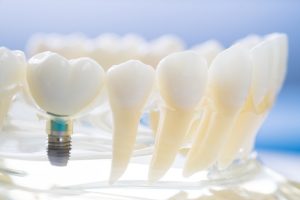 Your dental routine is intended to provide lifelong care, with protections spanning several areas to help keep your smile safe. Treatment such as fluoride and other options aim to provide a boost of strength where it is needed most, and taking care to visit our office once every six months for a routine checkup helps us monitor minor concerns and ensure they do not become major. Even still, life and other factors may have a different plan or idea, and complications such as decay or infection can arise and progress at a rapid rate. In today’s blog, your Pella, IA dentist explains what happens when decay takes over, and how a dental implant can be used to restore your oral function.
Your dental routine is intended to provide lifelong care, with protections spanning several areas to help keep your smile safe. Treatment such as fluoride and other options aim to provide a boost of strength where it is needed most, and taking care to visit our office once every six months for a routine checkup helps us monitor minor concerns and ensure they do not become major. Even still, life and other factors may have a different plan or idea, and complications such as decay or infection can arise and progress at a rapid rate. In today’s blog, your Pella, IA dentist explains what happens when decay takes over, and how a dental implant can be used to restore your oral function.
Understanding Structural Loss
It goes without saying that decay is one of the most common concerns out there, affecting millions of individuals every year. Like many complications to your health, dental decay is the result of hyperactive oral bacteria. These microorganisms are present in every smile, and removing them all is virtually impossible. Instead, we try to focus our attention and energy on mitigating their destruction and preventing them from getting out of hand.
When we consume items that contain sugar, these bacteria feed off of the particles and subsequently secrete destructive acids that weaken our natural structures. Without treatment or care, this can result in the formation of a cavity.
As decay progresses, your cavity will become larger and work its way into the inner workings of your tooth. Here, it will target your nerves and infect your dental pulp, and without care, will likely result in the need for removal.
Determining Severity and Success
With dental extraction comes a number of functional and structural complications. First, your bite will become uneven as your teeth have to accommodate for any missing structures when absorbing its natural pressure. Second, the longer a diseased structure remains present among healthy ones, the more likely you are to suffer from the loss of multiple teeth. Because of this, your dentist may recommend seeking a dental implant treatment to restore your function.
Another important aspect involves your jaw’s area and strength. Roots help stabilize crowns and stimulate the jaw, so when one is missing, the bone has nothing to keep it strong and will result in degradation.
Enjoying Your Lifelike Smile
It is always better to act sooner rather than later when pursuing a restorative procedure, as time will negatively impact the success of your treatment. Dental implants afford the ability to restore most of your function, in addition to providing a lifelike finish.
Learn More Today
For more information about creating your custom implant or to schedule your next appointment with our team, contact Allen & Neumann Family Dentistry in Pella, IA by calling 641-628-1121 today.



